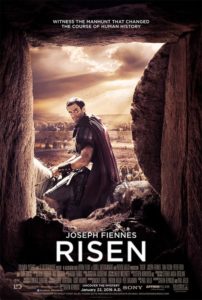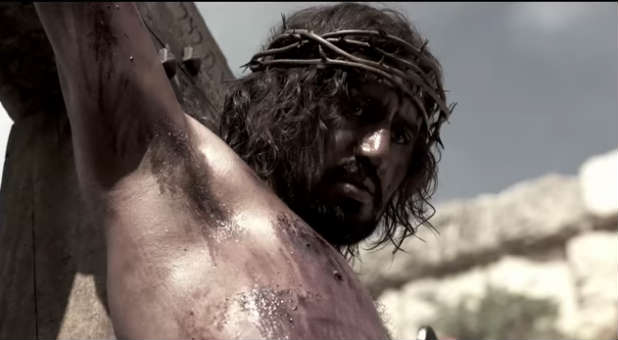Is This The Film That Resurrects The Biblical Epic?
 When Mel Gibson’s The Passion of the Christ came out almost 12 years ago, it caught studio executives off guard. Biblically based films hadn’t been done in a while, at least not without controversy in the case of Martin Scorsese’s The Last Temptation of Christ. But Mel Gibson wanted to do something quite shocking, he wanted to have an R-rated film that truly demonstrated what a crucifixion would have been like. He also filmed it using what many considered a dead language, with English subtitles. Amazingly, it made hundreds of millions of dollars at the box office and the result was that studios saw that they could target the large Christian audience to take advantage of the potential box office haul that apparently was laying dormant, just waiting for the right kind of films to come along. Studios created their own sub-studios to reach this targeted demographic. Films have come and gone, since The Passion of the Christ, with many having Christian themes, but many are set in the modern day. These have had varying levels of success from Kirk Cameron’s Fireproof, to the more recent faith based films like 90 Minutes in Heaven, Heaven is for Real, God’s Not Dead, War Room, and Little Boy.
When Mel Gibson’s The Passion of the Christ came out almost 12 years ago, it caught studio executives off guard. Biblically based films hadn’t been done in a while, at least not without controversy in the case of Martin Scorsese’s The Last Temptation of Christ. But Mel Gibson wanted to do something quite shocking, he wanted to have an R-rated film that truly demonstrated what a crucifixion would have been like. He also filmed it using what many considered a dead language, with English subtitles. Amazingly, it made hundreds of millions of dollars at the box office and the result was that studios saw that they could target the large Christian audience to take advantage of the potential box office haul that apparently was laying dormant, just waiting for the right kind of films to come along. Studios created their own sub-studios to reach this targeted demographic. Films have come and gone, since The Passion of the Christ, with many having Christian themes, but many are set in the modern day. These have had varying levels of success from Kirk Cameron’s Fireproof, to the more recent faith based films like 90 Minutes in Heaven, Heaven is for Real, God’s Not Dead, War Room, and Little Boy.
The real question is could the studios deliver a film that played like a Biblical epic, contained the crucifixion and resurrection of the Christ, but was not simply another retelling of the passion to capitalize on the ever-approaching Easter/Resurrection holiday? Enter the latest attempt from Affirm Films, a division of Sony, in a project called Risen. The story follows a decorated Roman Military Tribune named Clavius (Joseph Fiennes-Shakespeare in Love, Luther), along with his aide Lucius (Tom Felton-Harry Potter Series, Rise of the Planet of the Apes), who are tasked by Pontius Pilate (Peter Firth-MI:5, The Hunt for Red October) to help quell an uprising by the followers of Yeshua (Jesus) and other zealots who see him as the promised Jewish Messiah. With Caesar himself coming to visit, Pilate wants to ensure that this Yeshua stays buried so that his followers, disciples, cannot claim that he has risen from the dead as he had predicted. Pilate, along with the Jewish religious council called the Sanhedrin, believe the disciples will seek to steal the body to claim the prophesy of resurrection has come true as a means to rise up against Rome.
The story from this point on seeks to weave Clavius’ story in and out of the Biblical narrative. Clavius is a man with ambition who seeks to one day be promoted to Rome and eventually obtain enough power to retire in the countryside outside of Rome where he can finally experience a day without death. Much of this mirrors some of the ambitions of Russel Crowe’s character Maximus in the film Gladiator. But on this day, Pilate sends Clavius to Golgatha, meaning “the place of the skull” where he will be a witness to the death of Jesus. In this way the audience sees a movie about the passion, without it being a movie about that as such. Once the resurrection of Jesus takes place, Clavius, who left 2 guards there and who personally sealed the tomb shut with the large rock, ropes, and the insignia of Rome is summoned to investigate and find the body of Christ.

Clavius (Joseph Fiennes) and Lucius (Tom Felton) leave Pilate’s Palace to look at another corpse that may be Yeshua.
For the first half of the film, the story works very well as Clavius conducts the investigation with his aide Lucius. This man is a true skeptic, and a polytheist that sees Caesar as Lord, but who also prays to Mars for victory in battle. The story allows him to look for hard evidence, conducting interviews and looking at clues. It is once he encounters the moment of truth where he must decide if what he has witnessed is the evidence that confirms the resurrection as a real event that the story loses some of its steam. Joseph Fiennes is a good choice for this role and plays a steady, yet intentional Roman Tribune.
For most people of faith, they will enjoy the second half of the film as Clavius’ journey, both literal and spiritual, weave in and out of some of the more well known accounts in the New Testament Gospels.
The hiding in the upper room, the return to Galilee, the disciples return to fishing, and Jesus’ call to Peter in light of his triple denial on the night of Jesus’ trial. As a follower of Yeshua myself, it was because of these well known passages that the second half of the script did not work as well for me, and as a result, the ending fell flat. Weaving in an out of the narrative is one thing, but adding this Roman to the accounts themselves as a fellow participant seems to me to be violating the integrity of the accounts themselves. As long as one realizes that it is simply a plot device in a fictional work, and not meant to represent the scriptural account of Yeshua as other Biblical films have sought to do, like Mel Gibson’s The Passion of the Christ, then there won’t be much of a problem. For those wanting an accurate rendering of the Biblical tale as seen in the scriptures, then be prepared to be disappointed.
The film tries to have light moments during the investigation. Some of them work, like Lucius bringing in a blind woman to be questioned about what she “saw”. Others, like the disciple Bartholomew (Stephen Hagan) plays like Sean Penn’s Jeff Spicoli in Fast Times at Ridgemont High, if he were somehow a first century Jewish disciple of Yeshua talking in Mr. Hand’s class. It sounds weird, because it was really out of place in the midst of this serious investigation, but that’s a dead-on analogy.
The film is done well in terms of production value when compared to most of the faith-based films produced since The Passion of the Christ.
Many people who did not share the Christian faith, and who saw early screenings of it, told me that they found it to be a good film that they enjoyed even though they didn’t share the religious views espoused in the narrative. This bodes well for the film at large in terms of having cross-over appeal between people of faith and those who have differing beliefs. For that, Sony through their Affirm Films studios may have found a way to capitalize on reaching their desired faith based audience and even others outside that demographic as well. If Risen is that film, then you can bet that Jesus won’t be the only resurrection being celebrated at the movie theater in the future, but it may prove to resurrect the classic Biblical epic as well.



